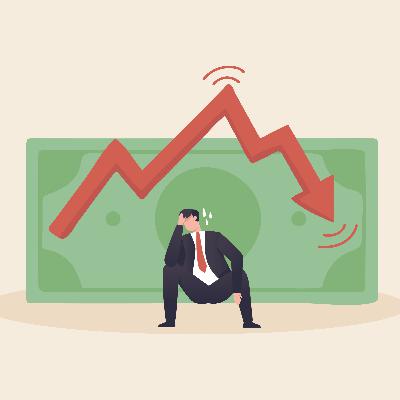Discover Finance & History
Finance & History

Finance & History
Author: Carmen Hofmann
Subscribed: 32Played: 460Subscribe
Share
© Carmen Hofmann
Description
The eabh Podcast. Looking for precedents from the exciting world of financial history. We follow money through time and space. We encourage independent research, encourage open debate and value archives. Follow us on: www.bankinghistory.org
Read less
Read less
53 Episodes
Reverse
How post-war finance remade Europe.In this episode, host Carmen Hofmann speaks with historian Tobias Straumann about his book Hitler’s Debt and the financial decisions that shaped Europe’s post-war recovery.We explore how settling Hitler’s unresolved debts, the 1953 London Debt Agreement, and bold U.S. policy choices helped turn a devastated continent into the “economic miracle” of the 1950s. Straumann explains why debt relief strengthened democracy, how leaders like Adenauer, Acheson, Schuman, Ben-Gurion and Sharett navigated moral and political dilemmas, and what the German case can teach us about today’s global debt crises.A concise look at how financial strategy, diplomacy, and compromise built the foundations of modern Europe — and why those foundations matter now more than ever.
Capital Matters: Banking, Risk, and HistoryIn this episode, Carmen Hofmann (eabh) speaks with Simon Amrein (Lucerne) about the role of capital in banking—past and present. They explore how banks have historically been funded, whether excessive leverage has made them fragile, and whether more capital really makes banks safer. The conversation touches on the functions and forms of capital, the trade-offs between safety and efficiency, and how capital helps prevent bank runs. They also reflect on how the post-WWII effort to rebuild economies reshaped global attitudes toward financial risk and regulation.
In this episode of 'Finance and History', Hugo Bänziger talks to Olli Rehn, Governor of the Bank of Finland, at the eabh annual conference. Together, they unpack the euro’s historic roots, from the Latin Monetary Union to today’s Economic and Monetary Union. Rehn shares insider insights on the euro’s creation, its crises, and the lessons learned along the way. The conversation also tackles central bank evolution, fiscal discipline, and Europe’s unfinished integration journey. An engaging deep dive into the intersection of financial history and contemporary policy challenges.
In this episode, we dive into how rising populism is reshaping capitalism and democracy. With Stefan Hofrichter (AllianzGI) Hans-Jörg Naumer (Allianz GI)—authors of Capitalism, Populism and Democracy— and Carmen Hofmann (eabh) we unpack the economic roots of today’s populist surge, its historical parallels, and what it means for markets, growth, and inequality.They connect past crises to current trends, revealing how financial history helps unpack the impact of past populist regimes on economic growth and investor behavior—lessons that matter now more than ever.
What are the effects of political instability on the banking sector?
In this episode, Juan Flores Zendejas (Geneva) and Carmen Hofmann (eabh) explore the impact of political instability on the banking sector, focusing on Mexico in the 1920s—a decade ravaged by civil unrest and political violence. How did banks and their customers respond during times of armed conflict? What were the lasting effects of this turbulence on the financial landscape? Tune in for a deep dive into the fascinating history of banking in Latin America during one of its most tumultuous periods.
In this episode, we explore how hyperinflation in emerging markets devastates economic stability, causing extreme price hikes, undermining savings, and creating uncertainty that stifles growth and investment. Following the end of the Great Moderation, Moritz Kraemer (LBBW & SOAS) and Carmen Hofmann (eabh) delve into whether the world has improved in managing hyperinflation episodes in these markets. Tune in to hear their insights and analysis.
🎙️ Step into the world of economic impact and war in our latest podcast episode! Join Willi Mutschler (Tuebingen) & Carmen Hofmann (eabh) as they delve into the profound findings of a recent study by the Kiel Institute for the World Economy. Explore the reasons behind nations going to war, the costs involved, and the role of monetary policy in mitigating these impacts. Get ready to uncover why we should all be prepared to be neighbors of war sites! Don't miss out on this insightful discussion. #eabhPodcast #FinancialHistory 🎧
Join Charles Goodhart, former Bank of England official, and Hugo Bänziger, chairman of eabh in a captivating discussion on the end of the Great Moderation. Dive deep into geopolitics, China's ascent, demographics, and debt markets through the expert financial history lens they provide.
Curious about the impact of rising interest rates on debt markets? Wondering who will step up to purchase long-term debt? Concerned about managing debt levels exceeding 100%? Is the threat of hyperinflation real? Could following in Argentina's footsteps lead us to the fiscal reform essential for the future?
Take a step back and embrace a long-term perspective with these esteemed financial experts. Explore the complexities of the financial landscape and gain valuable insights into the way forward. Don't miss out on this enlightening discussion! #eabh
Join Mariusz Lukasiewicz (Leipzig) and Carmen Hofmann (eabh) as they delve into the history of the Johannesburg Stock Exchange, a mirror reflecting the broader history of South Africa. Discover the captivating story of industrialization, internationalization, and financialization through the eras of Empire and independence. This tale of financing gold, diamond, and copper mining in the past offers valuable insights into the current state of South African mining finance.
Why do banks fail? What are the characteristics of banks that fail? Are these consistently the same over the course of history? Emil Verner (MIT) says yes, there are some commonalities all US banks that failed in the last 160 years share; moreover he claims that bank failures are quite predictable. Why then don't we prevent most bank failures? Or shouldn't we after all?
Emil Verner (MIT) in conversation with Carmen Hofmann (eabh)
The conversation draws on a paper jointly written with Sergio Correia (Federal Reserve System) and Stephan Luck (Federal Reserve Bank of New York).
How to regulate banks effectively?
Alexander Nützenadel (Humboldt University Berlin) makes a case for banking regulation being a cyclical affair. He and his colleagues started out to do the first quantitative analysis of banking supervision in the 20th century. Alexander and Carmen Hofmann (eabh) discuss his findings during what he calls the longest regulatory cycle in history (1930 -1970).
Are there lessons to be learned for today's regulators ? For instance how to deal with algorithmic trading or passive asset management?
Tune in to be informed!
#eabhPodcast
In this episode Maylis Avaro (Penn University) and Carmen Hofmann (eabh) discuss the international role of Sterling during the Bretton Woods era. Maylis claims that after 1945, the collective interests of the members of the sterling zone (stability of trade, free flow of capital, freer trade, access to London markets) were little compared to the cost of having UK authorities using the currency as a means of political domination.
Tune in and listen to a fascinating story of currency, empire & independence!
#eabhPodcast
Volker Berghahn (Columbia) & Carmen Hofmann (eabh) talk about European reconstruction after World War I, World War II and the Ukrainian War of today. Why was the reconstruction effort after 1945 so much more successful than the endeavours in the interwar years?
How should global aid be given? Does private or public money serve the matter better? Which should come first? Loans or grants? Do we need peace to rebuild? Who should guarantee for the money given? Who will profit? Volker and Carmen discuss these questions and try to look closely at the roadmap history could provide for Ukrainian reconstruction in the future.
#eabh Podcast
A practitioner's perspective with Edgar Walk (Metzler Bank) and Carmen Hofmann (eabh).
How can history insight help to bridge the gap between mathematical economic theory models and the 'real world of finance'? Edgar shares his insights from more than 20 years at one of the world's oldest private banks. How can history serve as a framework to identify financial and political cycles? How can it help to build a framework to see risks clearly and take sound long-term investment decisions? Listen up to get financial history insight!
#eabh Podcast
Stein Berre (New York Fed) & Paul Kosmetatos (University of Edinburgh) talk to Carmen Hofmann (eabh) about the first global credit crisis (1772/73). Which role did innovative financial products play? How did financial contagion propagate the initial shock and in which way did authorities intervene to stabilise markets?
Interestingly enough, the events 200 years ago resulted in a larger role of central banks within the architecture of finance. These state institutions then used certain stabilisation techniques that are still in place today. What is it that defines their success?
This episode is about one of the oldest banks in Europe. Alex Cooper (Leicester University) and Carmen Hofmann (eabh) discuss the financial needs of an island society and how banks are an integral part of local communities' fabric. In the case of Sicily, the creation of its own issuing bank was crucial for both; access to London capital markets and independence from British governance. Listen to hear why money always circulates!
This episode tells the story of the rise and fall of the Mississippi Bubble (1720) in Saint Domingue (Haiti). Malick Ghachem (MIT) discusses with Carmen Hofmann (eabh)why money seems not to be working for Haiti today and how he sees the roots of the country's financial malfunction in its past. Listen to learn how Haiti's struggle for independence is connected to the debt crisis of Louis XIV and the invention of paper money in France.
#eabhPodcast #Finance&History
How shall companies confront a difficult past?
In the most transparent way. So say Mike Anson (Bank of England) and Michael Bennett (Sheffield University) in conversation with Carmen Hofmann (eabh).
The topic of this episode is the collection of slavery compensation (1835 -43); after slavery was abolished within the British Empire in 1833. Part of a compromise that helped secure abolition was a compensation package for British slave owners for the loss of their ‘property’. The Bank of England administered the payment of slavery compensation on behalf of the British government.
Listen to Mike & Michael showcase the Bank of England archive and shed new light on the matter.
#FinanceandHistory #eabhPodcast
With Ghassan Moazzin (University of Hong Kong), Carmen Hofmann (eabh) talks about the integration of China into the world economy in the late 19th century. It's the time towards the end of the Imperial period in China. Did foreign actors impose Western capitalism or merely fill an ever growing institutional void and need for capital to finance reform and build critical infrastructure? Listen to Ghassan explain why the truth is likely to be found in the nuance of history. And what he thinks of China coming full circle with the Belt and Road Initiative...
Are real sector bailouts good public policy in crisis?
In early 1932, President Hoover created the Reconstruction Finance Corporation during the depth of the Great Depression. The objective was to protect the credit structure and stimulate employment. The loans given were below market interest rates; hence qualified as bailouts. Gertjan argues that these bailouts benefited existing employees and bondholders, but did they meet the goal of keeping credit flows alive? In this episode, we discuss the new deal railroad assistance and its implications for today: Are real sector bailouts good public policy in crisis?
Gertjan Verdickt (KU Leuven) in conversation with Carmen Hofmann (eabh)
























